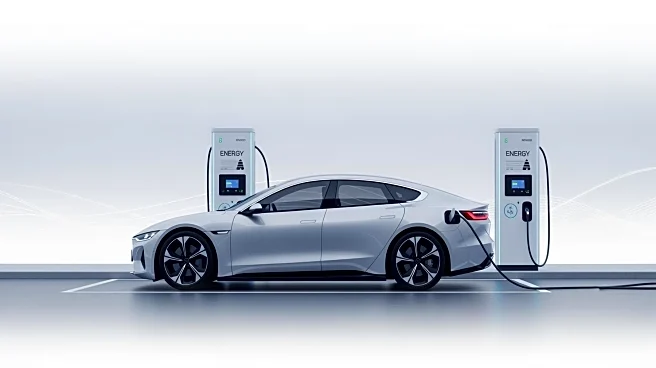What's Happening?
Tesla has announced record vehicle deliveries for the third quarter of 2025, with 497,099 units delivered, marking a 7.4% year-over-year increase. This surge in deliveries was largely driven by U.S. buyers
rushing to take advantage of the expiring $7,500 electric vehicle tax credit. Despite the impressive delivery numbers, Tesla's financial performance showed signs of strain. The company's revenue reached approximately $28.1 billion, surpassing forecasts, but profits were squeezed due to higher costs and significant price cuts. The adjusted earnings per share fell short of expectations, coming in at $0.50 compared to the anticipated $0.54. Operating income also saw a decline of about 40% year-over-year. Tesla's recent introduction of lower-cost 'Standard Range' versions of its Model Y and Model 3, priced between $36,990 and $39,990, did not meet investor expectations, leading to a drop in stock value.
Why It's Important?
Tesla's record deliveries highlight the company's strong market presence and the growing demand for electric vehicles. However, the financial results underscore the challenges Tesla faces in maintaining profitability amid rising costs and competitive pressures. The expiration of the U.S. tax credit could lead to a decline in demand, potentially impacting future sales. The introduction of lower-cost models aims to broaden Tesla's market appeal, but the modest price reductions may not be sufficient to drive significant new demand. The company's financial health is crucial for its ambitious plans in AI and autonomous driving, which are seen as key to its long-term growth strategy. Investors and analysts are closely watching Tesla's ability to sustain demand and manage costs in a competitive and rapidly evolving market.
What's Next?
Looking ahead, Tesla's focus will be on maintaining delivery volumes and profitability in the absence of the U.S. tax credit. The company plans to ramp up production of its new lower-cost models, which could help offset potential declines in demand. Additionally, Tesla's shareholders are set to vote on a proposed $1 trillion compensation plan for CEO Elon Musk, which has drawn criticism for being excessive. The outcome of this vote could influence investor sentiment and Tesla's governance practices. Analysts are divided on Tesla's future prospects, with some optimistic about its potential in AI and autonomous driving, while others caution that much of the anticipated growth is already reflected in the stock's high valuation.
Beyond the Headlines
Tesla's situation reflects broader trends in the electric vehicle market, where competition is intensifying, particularly from Chinese manufacturers like BYD. The global push towards electric vehicles is accelerating, but Tesla's market share could be challenged by new entrants and established automakers expanding their EV offerings. The company's focus on AI and autonomous technology positions it as a leader in innovation, but also subjects it to high expectations and scrutiny. The balance between maintaining its innovative edge and achieving financial stability will be critical for Tesla's continued success.








